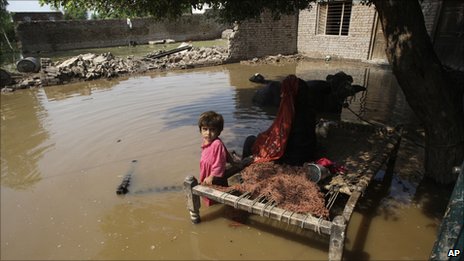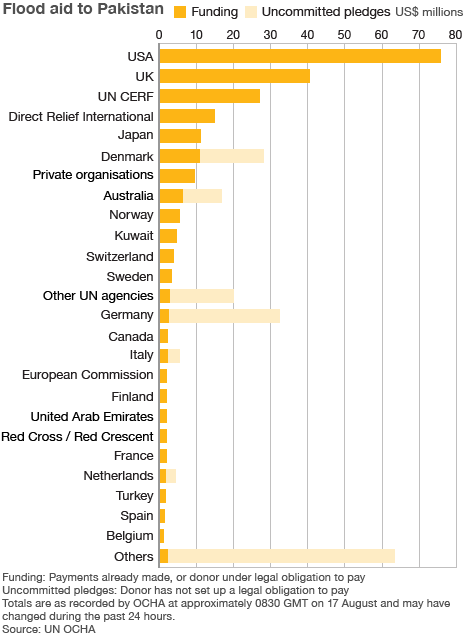Login form
Pakistan aid 'will not fall to extremists'
 Pakistan
Pakistan
The comments come as the UN said it had received less than half the $460m (£294m) it needs for the relief effort.
The shortfall has been blamed on fears over corruption and Taliban influence.
But Interior Minister Rehman Malik told the BBC the Taliban would not be allowed to take advantage of the crisis to increase its support.
"I assure the entire international community who would be supplying aid in any form, we give them assurance we will be auditable, he said, adding that the government was considering hiring international auditors to oversee the use of funds.
"This belongs to the poor people, the flood victims. I assure that it will travel to them."
Mr Malik said he was aware of the danger that the Taliban could increase its foothold in flood-hit areas by taking on charitable roles and winning support from survivors.
But he said this would not be allowed to happen and blamed the concerns on internal "party politics".
The
'Never expected'
Mr Malik's comments came as new flood warnings were issued for a series of towns in the north-west of the country, as the
The BBC's Jill McGivering in
More than 20 million people are already thought to have been affected by the floods, which are now covering an area the size of
Aid agencies say six million people are in need of immediate assistance but that hundreds of thousands have received no aid at all.
The distribution of supplies has been hampered by severe damage to the country's infrastructure, with roads and bridges washed away or blocked by landslides.
Survivors have criticised the government's response to the disaster, saying aid has been too slow to arrive and there are increasing reports of victims staging protests to demand help from the government.
Mr Malik said he was satisfied that the government had coped with the initial response but that it had been overwhelmed by the scale of the crisis.
"What happened was never expected. In the history of the whole subcontinent there was never such a disaster," he said.
"That is why were are making an appeal. The magnitude of disaster is so big,
But the UN is struggling to raise the money it says is urgently needed for the immediate relief effort. Spokesman Maurizio Giuliano said 40% of the $459m had so far been received and another $43m had been pledged.
"We would like our pledges to turn into cheques as soon as possible because the situation is getting very bad," he said.
Unicef, the UN's children's fund, called for "an urgent effort" from donors.
"Two million dollars are needed every day to provide water - this is not sustainable. We don't have two million dollars a day," said Unicef's regional director, Daniel Toole.
As well as buildings, large areas of crops and farmland have been washed away, leading to fears of food insecurity in the future.

"If immediate steps are not taken, we fear a famine," said Mian Iftikhar Hussain, a provincial information minister in northwest
"The farmers have lost everything: their crops, their machines, their houses, their seeds."
The World Bank has said it is redirecting $900m in existing loans to
On Tuesday,
State media in
Pakistani officials have said it could take five years and up to $15bn for the country to recover.
BBC Urdu will transmit six daily bulletins in Urdu and Pashto providing vital information including how to stay safe, avoid disease and access aid. Special programmes will be broadcast each day in Urdu at 12.30, 15.30 and 18.30 and in Pashto at 12.45, 15.45 and 18.45 (local times).
Source: bbc.co.uk

